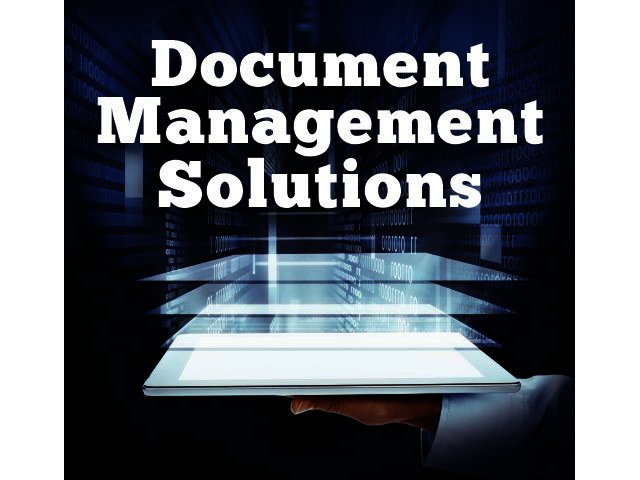Paperwork. Bureaucracy. Red tape. Descriptions abound for an organisation’s documents - and few of them are flattering. Business owners rarely credit paperwork as why they do what they do. But as the biggest annoyance to running a business it comfortably leads the pack.
Even those famous comic book Gauls, Asterix and Obelix, could fight off legions of Romans, but almost saw their end at the hand of bureaucracy. In the movie Asterix and the Twelve Tasks, the pair are driven near-insane trying to find a specific document as one of their challenges. Many people feel that way about handling company documents: it’s a road to madness.
Beyond The Red Tape
As such, Document Management Solutions (DMS) has a reputation of being a grudge purchase. It has also been framed as something that large corporations use to keep in line with country and corporate laws. But no business is immune from the demands of paperwork, even small outfits, so fortunately the modern DMS brings much more to the table, with better options and friendlier price tags.

Craig Nel, Sales Consulting Senior Manager of Fusion Middleware at Oracle South Africa
“I’m of the opinion that investing in DMS to satisfy only legislative requirements is a waste,” says Craig Nel, Sales Consulting Senior Manager of Fusion Middleware at Oracle South Africa. “For example, significant advantages could be derived from collaboration alone.”
Modern DMS has embraced technology as wholeheartedly as any other transforming sector in business, if not more so. Its role has expanded from merely keeping records to delivering information on demand. Many of the documents at a company contain vital information that create business advantages. Enterprises have been exploiting these perks, but thanks to technology those can now be enjoyed by smaller companies as well.
“Computerization has allowed for affordable solutions,” explains Guy Kimble, Managing Director at MetroFile. “Ten years ago DMS solutions were complicated, but the modern DMS is modular and fit for purpose, especially in terms of pricing. The local industry in particular has developed services specific to the South African market.”
.jpg)
Guy Kimble, Managing Director at MetroFile
Benefits explained
This evolution in DMS has opened the doors for more than keeping auditors happy. According to a member survey by the Association for Information and Image Management (AIIM), over half of companies want DMS to improve their collaboration and nearly two thirds want it to tie into an electronic content management (ECM) setup. But even if that sounds beyond the scope of your business, you can still benefit from a DMS.
“A DMS creates a centralised repository of your information,” says Ian Nel, MDS Sales Manager at Kyocera. “In small companies people tend to wear more than one hat, but when one of them leaves the company, how much information goes with them? How would you even know?”
DMS establishes good corporate governance, in turn creating uniformity and reducing cost implications. So when thinking about document management, consider the potential it adds.
“Over the years huge efficiencies have been gained through DMS,” says Kimble. “Companies have more control over risk and it is easier to create customer service opportunities. For example, you may have designs on record that can be useful to a new or existing client. How quickly you access that information will impact your business with that client.”
Web portals are examples of this: modern DMS solutions can incorporate cloud services and give secure online access to documents. What once lived in a file cabinet or isolated hard drive can now be accessed by a traveling salesperson, business branch or the boss during an important meeting, all on safe infrastructure managed by a vendor.
.jpg)
Ian Nel, MDS Sales Manager at Kyocera
Is DMS For You?
All that said, DMS is not necessarily a crucial component to every business. Instead it should be approached in a ruthlessly practical manner. Before even considering a DMS, study the type of documents your company deals with and how they tie in with business processes. Some companies use the services of consultants to suggest the best fit for their companies: because DMS can be deployed in small parts, there is no need to risk the farm by going all in. Instead a DMS is meant to compliment what a business needs. Integration is a big part of the modern DMS and causing the industry to evolve rapidly.
“Although DMS can be used as a standalone system, it has the most impact when tied to existing applications,” says Craig Nel. He adds that integration is key, so opt for solutions with open architecture and vendors with experience around the type of integrations your systems require. There is no real ‘one size fits all’, even though off-the-shelf DMS packages do exist: “See what your industry is using and talk to vendors with experience of that industry.”
“DMS implementations aren’t simple,” says Ian Nel. “Even though there are many common workflows, you don’t want to invest in functions you don’t need. Do you need to digitize your existing records or focus on new information? What kind of document management scheme works best with your staff? Which departments will benefit most? DMS is not a bolt-on - it will impact a business in fundamental ways. But if done right that impact is incredibly positive.”
Even buy-in from staff is less daunting than it seems: DMS support can be plugged into existing workspaces such as the Microsoft Office environment and modern search technology makes accurate retrieval much easier. Anyone who wrestles with the results of a lackadaisical record-keeping system will see the immediate benefits.
“Small businesses are becoming enlightened that good records equal a healthy company,” Kimble concludes. DMS has many parts and opens doors to advantages and efficiencies, including print management, and modern service models means the right fit can be found for the right price. If you are spending a lot of money storing old paperwork or finding missing digital documents, it’s time to ask: what can DMS do for your company?
_____________________________________________________________________________________________________________________________________
Paper vs Digital
One mental block to using DMS is the thought of reams of paperwork waiting to be digitized. But this is the wrong approach. The first question is whether those need to be digitized at all. According to Kyocera’s Ian Nel, prospective DMS users should understand the difference between records and documents.
Records are kept in storage for archiving reasons - most often to meet legislative and tax requirements. But documents play a more active role and may be accessed frequently. For example, the delivery notes for a logistics company are likely to bounce through an organisation several times before being archived away. In that case a digitization strategy would be important.
In industry parlance this is called the capture solution: if and how one is needed depends on several factors, including the department in question, staff at hand and the workload. Fortunately capturing physical records, though time consuming, is much more effective: capture solutions include scanning and converting text (a process called OCR), barcodes and other techniques. In some instances it may be as simple as taking a photo of a page with a mobile device.
A good rule of thumb is to see what company information is frequently accessed and if making those records available through a DMS regime will make things easier and more robust.





